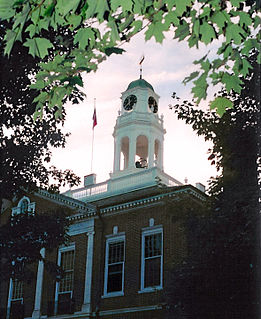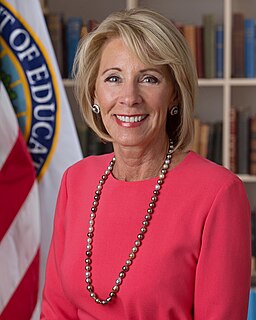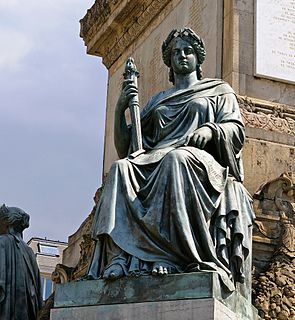A school voucher, also called an education voucher in a voucher system, is a certificate of government funding for students at schools chosen by themselves or their parents. Funding is usually for a particular year, term, or semester. In some countries, states, or local jurisdictions, the voucher can be used to cover or reimburse home schooling expenses. In some countries, vouchers only exist for tuition at private schools.
School choice is a term for pre-college public education options that describes an array of programs offering students and their families voluntary alternatives to publicly provided schools, to which students are generally assigned by the location of their family residence. The most common in the United States, by both the number of programs and by the number of participating students school choice programs, are scholarship tax credit programs, which allow individuals or corporations to receive tax credits toward their state taxes in exchange for donations made to non-profit organizations that grant private school scholarships. In other cases, a similar subsidy may be provided by the state through a school voucher program.
State schools or public schools are generally primary or secondary schools that educate all children without charge. They are funded in whole or in part by taxation. State funded schools exist in virtually every country of the world, though there are significant variations in their structure and educational programmes. State education generally encompasses primary and secondary education.

A Christian school is a school run on Christian principles or by a Christian organization.

An independent school is independent in its finances and governance. Also known as private schools, non-governmental, privately funded, or non-state schools, they are not administered by local, state or national governments. In British English, an independent school usually refers to a school which is endowed, i.e. held by a trust, charity, or foundation, whilst a private school is one which is privately owned.

The Blaine Amendment was a failed amendment to the U.S. Constitution that would have prohibited direct government aid to educational institutions that have a religious affiliation. Most state constitutions already had such provisions, and thirty-eight of the fifty states have clauses that prohibit taxpayer funding of religious entities in their state constitutions.
In United States law, the Establishment Clause of the First Amendment to the United States Constitution, together with that Amendment's Free Exercise Clause, form the constitutional right of freedom of religion. The relevant constitutional text is:
Congress shall make no law respecting an establishment of religion, or prohibiting the free exercise thereof...
Zelman v. Simmons-Harris, 536 U.S. 639 (2002), was a 5–4 decision of the United States Supreme Court that upheld an Ohio program that used school vouchers. The Court decided that the program did not violate the Establishment Clause of the First Amendment even if the vouchers could be used for private, religious schools.

Elisabeth Dee DeVos is an American politician, philanthropist, and former government official who served as the 11th United States secretary of education from 2017 to 2021. DeVos is known for her support for school choice, school voucher programs, and charter schools. She was Republican national committeewoman for Michigan from 1992 to 1997 and served as chair of the Michigan Republican Party from 1996 to 2000, with reelection to the post in 2003. She has advocated for the Detroit charter school system and she is a former member of the board of the Foundation for Excellence in Education. She has served as chair of the board of the Alliance for School Choice and the Acton Institute and headed the All Children Matter PAC.

Freedom of education is the right for parents to have their children educated in accordance with their religious and other views, allowing groups to be able to educate children without being impeded by the nation state.

Capitalism and Freedom is a book by Milton Friedman originally published in 1962 by the University of Chicago Press which discusses the role of economic capitalism in liberal society. It sold over 400,000 copies in the first eighteen years and more than half a million since 1962. It has been translated into eighteen languages.

The Alliance for School Choice is the largest organization in the United States promoting school choice programs. The Alliance for School choice supports the creation and expansion of school voucher, corporate tax credit, and other school choice programs. The organization is headquartered in Washington, DC, is designated as a 501(c)(3) nonprofit organization, and receives its funding through private individual and foundation donations.
The Council of Parent Attorneys and Advocates (COPAA) is an independent national American association of parents of children with disabilities, attorneys, advocates, and related professionals who protect the legal and civil rights of students with disabilities and their families. COPAA has a 22-member Board of Directors who run the organization. Board members are selected to be representative of diversity of COPAA's peer-to-peer network and have significant experience in various aspects of COPAA's work. Currently COPAA has more than 2800 members in all states, the District of Columbia and several territories. Over 90% of all of its members, including professionals, are people with disabilities and/or parents and family members of people with disabilities. COPAA accomplishes its mission largely through the work of its network of volunteers, who are supported by the staff of the organization.

EdChoice, formerly the Friedman Foundation for Educational Choice, is an American education reform organization headquartered in Indianapolis, Indiana. It was founded in 1996 by economist spouses Milton and Rose D. Friedman. The organization's mission is to advance "school choice for all children" nationwide.
Mueller v. Allen, 463 U.S. 388 (1983), was a United States Supreme Court case examining the constitutionality of a state tax deduction granted to taxpaying parents for school-related expenses, including expenses incurred from private secular and religious schools. The plaintiffs claimed that a Minnesota statute, allowing tax deductions for both public and private school expenses, had the effect of subsidizing religious instruction since parents who paid tuition to religious schools received a larger deduction than parents of public school students, who incurred no tuition expenses.
A charter school is a school that receives government funding but operates independently of the established state school system in which it is located. It is independent in the sense that it operates according to the basic principle of autonomy for accountability, that it is freed from the rules but accountable for results.

Step Up for Students is a 501(c)3 nonprofit in Florida providing low income students, bullied students and students with special needs with scholarships to help pay tuition for private school, assistance to attend an out of district public school, or for tutoring, textbooks or therapies. Step Up For Students was created as part of a merger between Florida's two largest scholarship organizations Florida P.R.I.D.E and Children First, which was founded by Tampa Bay businessman John Kirtley. Kirtley had founded a previous scholarship organization, Children's Scholarship Fund of Tampa Bay in 1998 and received more than 15,000 applications for 750 available scholarships. The large demand led Kirtley to help push for the creation of the Florida Tax Credit Scholarship, which was signed into law in 2001. That scholarship program allows donors to receive dollar for dollar tax credits for contributions to nonprofits offering scholarships to low-income students in Florida. The scholarship was capped at $50 million for the 2002-03 school year and scholarships were awarded to 15,585 students.

The Demands of Liberal Education is a 1999 political philosophy book by Meira Levinson that establishes a liberal political theory of children's education that fits the mutual needs of the state and its diverse citizenry. She writes that the intent of a liberal education—an education that follows from a liberal society's values—is to maximize the autonomy of individual children through increasing their capacity for liberty. Levinson argues autonomy as a right to children. The book, published by Oxford University Press, aims to address a lacuna between educational policy and liberal political theory.
Michael F. Adubato was an American Democratic Party politician who served nine consecutive terms, a total of 18 years, in the New Jersey General Assembly from 1974 to 1992, representing the 28th Legislative District for four terms and then being shifted after redistricting to the 30th Legislative District where he served for an additional five terms.

Tom Leatherwood is an American politician serving in the Tennessee House of Representatives from Tennessee's 99th house district, since 2019. He is a member of the Republican Party. The 99th district includes the Northeast part of Shelby County, Tennessee, including the Town of Arlington, City of Lakeland, City of Millington, parts of North and East Bartlett, and unincorporated Northeast Shelby County.










